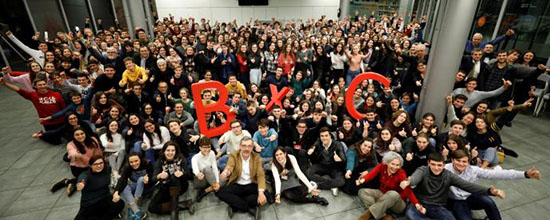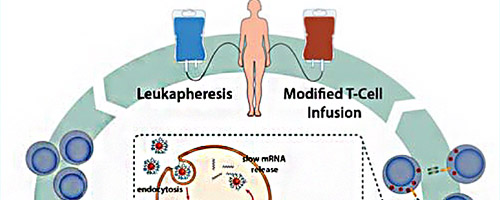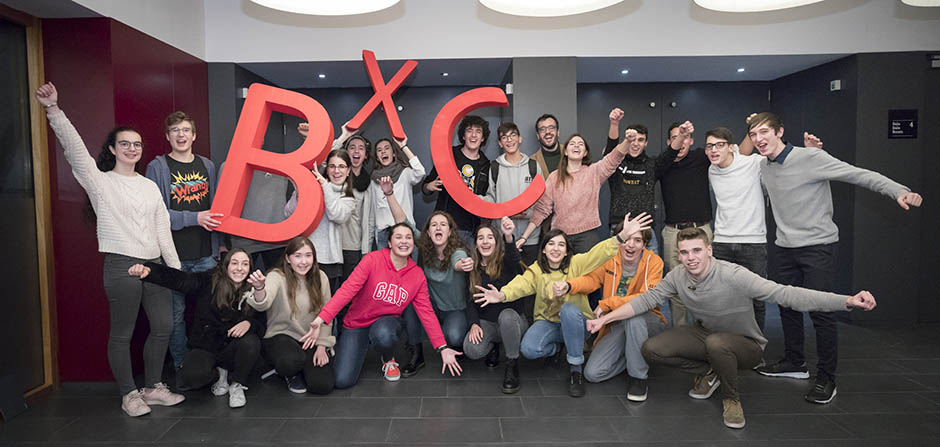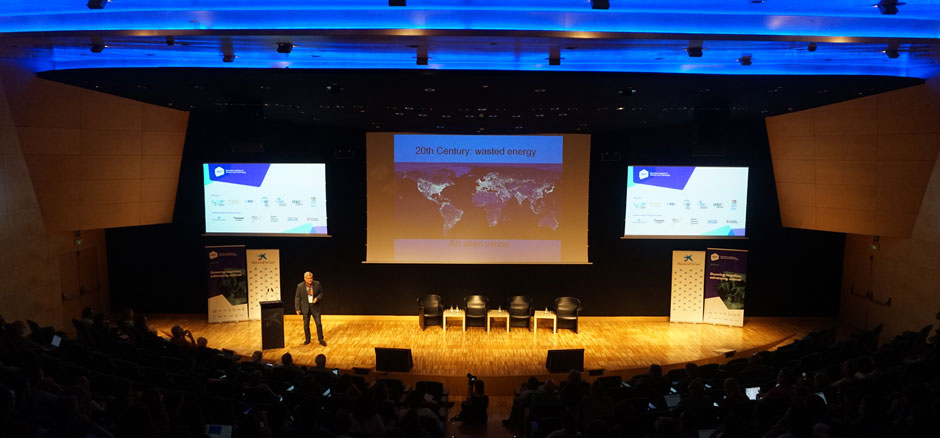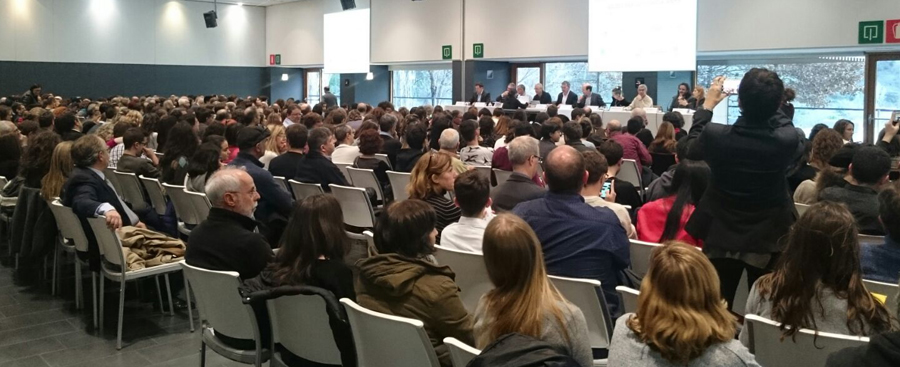News
A study published in ‘Nature Communications’ and carried out by researchers from the Polytechnic University of Catalonia (UPC) and the Catalan Institute of Nanoscience and Nanotechnology (ICN2) unveils a photocatalyst that enhance the production of hydrogen through chemical reactions activated by light. The authors synthesised this stable photocatalyst using platinum nanoparticles deposited on titanium dioxide.
La Vanguardia, a prominent Spanish newspaper, organised a colloquium on the 28th of March at Hotel Seventy in Barcelona to celebrate female achievements in science and promote discussions on gender equality, diversity, and innovation in science and technology. The event featured Dr Neus Bastús as one of the esteemed panelists.
Join us on Tuesday, March 7th, at the ICN2 Seminar room, to celebrate International Women's Day, wich is to be officially celebrated the day after the ICn2 event. This Day is an occasion to celebrate women's social, economic, cultural, and political accomplishments. In the research field, women have made significant contributions to scientific knowledge and breakthroughs, yet they remain underrepresented in many areas. Achieving gender equality in research is crucial for scientific excellence and innovation, making ICN2 committed to promoting equal opportunities and supporting female researchers' career development. This special event will recognize and honor the outstanding achievements of the Women Talent 2022 Awardees.
Bojos per la Física programme inspires high school students to pursue their passion for science and physics
The R+D+I Energy for Society Network (XRE4S) provides consultancy and mentoring in industrial strategy, property protection, and market positioning to researchers who are interested in transferring their technologies to an existing company or founding a new one. Five spin-offs have been recently created with the support of XRE4S and one more (from the ICN2) may be established soon.
The event, which was organised by group leader Prof. Laura Lechuga and counted on the participation of many members of the ICN2 community, aimed at bringing together researchers in the field of nanomedicine, clinicians from relevant hospitals, and healthcare industry experts to share results and views both on recent advances in the field and on effective procedures to transfer new technologies into clinical practice.
The Severo Ochoa Workshop dedicated to Environment, one of the four areas of applications of the current ICN2 SO Programme, took place in Barcelona on 16-17 December. It comprised three sessions of talks having a different focus and a round table with industrial partners.
The project submitted by Dr Begonya Marcos, researcher at IRTA, and Oscar Hernando Moriones, PhD student in the ICN2 Inorganic Nanoparticles Group, proposes a novel methodology based on hyperspectral vision to analyse food and detect the presence of microplastics.
The unique properties of materials at the nanoscale offer opportunities for developing novel techniques to decontaminate polluted areas, which would reduce the impact of the process, while increasing its efficacy and penetrability. The state-of-the art and future perspectives of research in nano-remediation, balancing risks and benefits, is presented in a review recently published in “Science of Total Environment”.
Dr Civan Avci, Dr Ceren Çamur and Dr Javier Ivan Patarroyo Rengifo, former doctoral students at the ICN2 and the UAB, received this award for their theses, defended in the academic year 2018-1019.
On the occasion of the International Women’s Day, the ICN2 organised a round table held by women with different profiles working at out institute. Participants analysed the additional challenges introduced by the pandemic situation we are living in and its implications. The event included an awards ceremony to reward the best ICN2 papers and best Ph.D. thesis led by women.
A study led by Vall d’Hebron and the Catalan Institute of Nanoscience and Nanotechnology (ICN2) has shown, thanks to the use of gold nanoparticles and cell cultures, that enhancing the activity of natural killer cells of the immune system is key to eliminating HIV infection.
The ICN2 is involved in a series of initiatives to support this day to raise awareness of the persistent gender gap un the world of research. Some ICN2 women researchers will participate in “100tífiques” to bring science and the role of women in Science closer to young students.
Science communicator Jordi Díaz presented last Tuesday his new initiative: “Entrevistas confinadas” (confined interviews), in which he will explore the different sides of nanoscience and nanotechnology in society (applications, ethics, education, arts…). His first guest was ICREA Prof. Víctor F. Puntes, Leader of the ICN2 Inorganic Nanoparticles Group.
Researchers of the ICN2 Supramolecular NanoChemistry and Materials group and of the ICN2 Inorganic Nanoparticles group have designed, synthetized and tested microbeads, based on a combination of Metal-Organic Frameworks materials and inorganic nanoparticles, that are able to simultaneously remove multiple heavy metals from polluted water.
This liver cancer is the most common and is in need of new therapeutic approaches. A long-term collaboration between IDIBAPS and ICN2, led by Prof. Wladimiro Jiménez and Prof. ICREA Víctor F. Puntes, has demonstrated that the administration of cerium oxide nanoparticles in a rat animal model can compete with the best currently available treatments. The Research published in Hepatology shows that human tissues also absorb and retain the nanoparticles, making them a potential and promising new drug strategy.
On the occasion of the World Cancer Day, occurring on February 4 and dedicated to global awareness about cancer, we would like to highlight various research lines oriented at improving tumour diagnosis and treatment in which the ICN2 is involved.
27 High School students will interact during 16 work sessions with researchers from all the participating excellence centers offering exciting experiences that explore the biggest and the smallest scales of the universe. Coordinated from the ICN2 and the IFAE, Crazy for Physics (Bojos per la Física) also involves the UAB, the ICMAB, the ICFO, the ICE, the UB and the Alba Synchrotron.
The award is given to the best doctoral thesis on colloids and interfaces.
The Societat Catalana de Nanociència i Nanotecnologia held its First Annual Congress of Nanoscience and Nanotechnology last Saturday 16 November. It counted with the participation of several ICN2 researchers as organisers and as speakers. Discussing the role of nanotechnology in the ecological challenges was the central axis of the event.
The IFAE and the ICN2 have coordinated the fourth edition of the Crazy for Physics oprogramme promoted by the Fundació Catalunya La Pedrera. A selected group of highly skilled undergraduate students have enjoyed a series of experiences at excellence research centers.
A new immunoassay test to distinguish viral from bacterial infections could help reduce the use of antibiotics and the consequent development of drug-resistant bacteria. This study published in Nanoscale has been carried out by a team of researchers led by Prof. Kimberly Hamad-Schifferli, from the University of Massachusetts, and ICREA prof. Victor F. Puntes, from the ICN2 and the VHIR.
The 16th edition of the NanoSpain Conference, annual appointment for experts in nanoscience and nanotechnologies, will take place at the Parc Científic of Barcelona from 28 to 31 May.
The ICN2 and the IDIBAPS will lead a project, cofounded by the European Regional Development Fund (ERDF – FEDER), to develop a drug based on cerium oxide nanoparticles for liver cancer treatment.
Today and tomorrow the European project HISENTS, which designs a platform to predict the potential toxicity of new nanomaterials on different biological aspects, is celebrating its closing meeting at the ICN2.
Selected by the European Commission through the EuroNanoMed programme, this project aims to improve CAR T cell therapy using messenger RNA (mRNA). Its aim is to make the therapeutic effect more sustained thanks to gold nanoparticles that will control the release of mRNAs. The project is coordinated by the ICN2 and has the experience of Hospital Clínic de Barcelona - IDIBAPS, IRCCS - Istituto di Ricerche Farmacologiche "Mario Negri" in Milan and Tel Aviv University in Tel Aviv.
25 High School students will interact during 16 work sessions with researchers from all the participating excellence centers offering exciting experiences that explore the biggest and the smallest scales of the universe. Coordinated from the ICN2 and the IFAE, Crazy for Physics (Bojos per la Física) also involves the UAB, the ICMAB, the ICFO and the Alba Synchrotron.
The 3rd edition of the Crazy for Physics programme, funded by the Fundació Catalunya / La Pedrera and coordinated by the ICN2 and IFAE, ended at Món Natura Pirineus with a weekend devoted to science and the future perspectives of the participants. Some 25 outstanding high school students enjoyed a year of theoretical and practical experiences at some of the best Catalan research centres.
The European Researchers’ Night is a Europe-wide effort to boosts public awareness of the positive role of research in society. This year’s program included a series of events at CosmoCaixa, with a specific area devoted to nanoscience and nanotechnology. Many coordinated institutions, including the ICN2, made it possible.
The PhD student from the ICN2 Inorganic Nanoparticles Group was awarded for a poster about the synthesis of silver nanorods.
BIST Director General says modernising research facilities and providing training to boost the social impact of science are the top priorities of the Barcelona Institute of Science and Technology. The event, held at CosmoCaixa, offers an overview about several transversal research issues being tackled by the BIST institutions.
The 10alamenos9 Festival of Nanoscience and Nanotechnology was held last week, with over 100 activities to choose from across many locations in Spain. Among them, the UAB Campus in Bellaterra, where a lively activity was run for over 200 students, including a visit to the ICN2.
Today the Barcelona Institute of Science and Technology (BIST) announce the five projects that will receive seed funding under the 2018 edition of its Ignite programme to accelerate multidisciplinary research at its member institutes.
ICREA Prof. Victor Puntes, leader of the ICN2 Inorganic Nanoparticles Group, discussed the latest advances in nanomedicine on regional radio station RAC1. He shared the Via Lliure microphones with Dr. Elena Martínez of IBEC and science journalist Núria Jar.
The University Institute of Nanochemistry IUNAN has announced the winners of the first Biennial Scientific Photography Award. PhD student Javier Patarroyo of the ICN2 Inorganic Nanoparticles Group took second prize.
An article in Ara newspaper reflects on what makes a cyborg a cyborg and considers the far-reaching influence that technology has on human beings. ICREA Research Prof. Victor F. Puntes shares his views on how nanorobots and nanoparticles will change the diagnosis and treatment of diseases such as cancer. For him, if humankind were ever to achieve immortality, we would be doomed within five minutes.
PhD student Jordi Piella of the ICN2 Inorganic Nanoparticles Group was awarded the Best Poster Award at the II Workshop on Chemistry of Group 11 Elements.
Mad for Science is a consolidated Program organised by Fundació Catalunya-La Pedrera and devoted to bring High School sudents closer to research. ICN2, IFAE and UAB lead the second edition of Mad for Physics. It is a great opportunity for 25 brilliant young students to have a first contact with real research. The Program offers an overview of different research lines, including the participation of researchers from ICMAB, ICFO and Alba Synchrotron.
Researchers from clinical and basic research institutes located in Barcelona used Cerium oxide NPs to treat cirrhosis in model rats. In a work published in Journal of Hepatology, they observed how it has dramatic beneficial effects in reducing inflammation and allowing tissue reparation. What makes nanoceria very appealing is its high capacity to buffer electrons from an oxidant/reducing environment, followed by the capture or release of oxygen, or molecular oxygen species which are very reactive oxygen species (ROS).
L’Illa de Robison is a TV show broadcasted in the Catalan TV station El Punt Avui TV. The program was recently devoted to Nanotechnology, including the participation of the ICN2 – VHRI ICREA Prof Victor Puntes and Dr. Jordi Díaz, from the CCiTUB (UB Scientific and Technologica Centers) and member of the Nanoeduca initiative involving ICN2.
Applied Nanoparticles, a Spin Off company emerged from a research led from ICN2 and UAB, was highlighted in La Vanguardia for being able to triple biogas production by using nanoparticles. ICREA Prof Victor Puntes, Group Leader at ICN2, presents the project.
Five companies from the UAB Research Park network have been selected and will receive funding for their projects with a total of 272,245 euros. Applied Nanoparticles was gestated from the research led by the ICREA Research Prof. Victor Puntes, Group Leader of the ICN2 Inorganic Nanoparticles Group. The objective of this grant is to fund a business feasibility study.
ICREA Prof Victor Puntes was interviewed by Xavier Duran about recent advances in biomedicine. The result is an article in the Barcelona Metropolis magazine edited by the Barcelona City Hall. Prof Puntes discusses about how biomedicine and nanoscience have a common future.
About 90 High School teachers attended the event on July the 7th and they were introduced to the nanoworld. The organizing committee formed by ICN2, UB, UAB and CESIRE explained the different steps of the program and gave some tools and resources to communicate nanoscience. ICREA Prof Victor Puntes gave a talk about the state-of-the art of nanomaterials.
In an interview by the magazine Investigación y Ciencia, ICREA Research Prof Victor Puntés discusses about nanoparticles, the connection between art and science and the future of new generations, among other topics.
Hospitals and biomedical related initiatives gathered at ICN2 to discuss about the potential of nanotechnology in the field of biomedicine, with a special emphasis on biosensors. The workshop, organised as part of the Biosensors B30 project, explored the opportunities of establishing shared biosensor projects.
Once more, a group of students have made their first contact with nanotechnology visiting the ICN2 facilities in a new ESCOLAB visit. They had the opportunity to enter the laboratories of the Inorganic Nanoparticles Group and interacted with the nanoscale through a hands-on experimental session led by the Communication Department.
The Catalan newspaper ARA is releasing a series of conversations between artists and scientists where they explain the similarities of the two disciplines. The talks are presented in online videos and they take place in different environments which have a special relation with what they are talking about. In one of the videos, ICN2 Prof Victor Puntes has a conversation with the magician Sergi Buka and they discuss the connections of nanotechnology and illusionism.
Tres14 is a science dissemination Program with a long history at the Spanish Television (RTVE, La 2). Yesterday’s Episode was devoted to New Materials, and it includes an extensive interview with ICREA Research professor and ICN2 Group Leader Prof. Victor Puntes.
Developed by researchers from ICN2 and the UAB, it is the first application using nanoparticles to improve the production of this source of renewable energy and the treatment of organic waste. The technology will be commercialised under the newly created spin-off Applied Nanoparticles.
ICREA research Prof. Victor Puntes talks about the relevance of the Nobel Prize in Chemistry 2014 for the development of super-resolved fluorescence microscopy.
The ICN2 researcher talked about nanomedicine together with Dr. Josep Tabernero, Director of Vall d’Hebrón Institut d’Oncologia (VHIO).
In an interesting interview (in Spanish), ICREA Research Prof. Victor Puntes shares his view about the impact of nanoscience, the research he leads and scientific vocations.
Technology investment firm Nanonica has announced that in 2013 it will award a Nanotechnology prize in two categories, with cash rewards of €10,000 and €5,000.
The deadline for entries is 20 August 2013.
ICREA Prof and ICN Group Leader Victor Puntes and colleagues publish article on the environmental risks and benefits of inorganic nanoparticles in Investigación y Ciencia
ICREA Professor Victor Puntes, who heads ICN’s Inorganic Nanoparticles Group, was interviewed by Catalan daily El Punt Avui for their 9 December issue. (photo: Josep Losada).
Publishing in PLOS One, ICREA Research Professor Leader Victor Puntes and colleagues report safe and effective gold-nanoparticle delivery of cisplatin in mouse models of cancer.
Continuing on their previous advances in this project, the team offers detailed information on the safety, efficacy and fate of gold nanoparticle conjugates of cisplatin administered to mice with tumours, including their distribution in and effects on different body tissues.
The project, led by ICREA Research Professor and ICN Group Leader Victor Puntes, deals with the use of cerium oxide nanoparticles for treatment of liver maladies
The 2011 edition of La Marató de TV3 raised €8 million for research in Tissue and Organ Regeneration and Transplant, which have just been awarded to 29 research projects led by 56 researchers.
Catalan newspaper publishes story about work led by ICREA Research Prof Victor Puntes on use of gold nanoparticles for delivery of the chemotherapeutic agent cisplatin
Nanotargeting and Ferrer sign agreement to develop the treatment, based on the work of ICN Group Leader Victor Puntes and colleagues at other centres.
Delivery of the chemotherapeutic agent Cisplatin to the tumour site by gold nanoparticles prevents many of the side effects that occur with traditional administration.
ICN researchers and colleagues report in ACS Nano a gold nanoparticle-based system to remove mercury(II) from water. The system generates an easily removable and recyclable precipitate.
"Citrate-Coated Gold Nanoparticles As Smart Scavengers for Mercury(II) Removal from Polluted Waters". (Puntes, Ojea-Jiménez, et al., ACS Nano, 2012, 6 (3), 2253–2260)
Researchers at the Catalan Institute of Nanotechnology (ICN) have successfully demonstrated a new method for producing a wide variety of complex hollow nanoparticles. The work has been published in Science.
A common theme in nanoscience research is the recycling of "old" processes and protocols that were once applied crudely on bulk materials in trades and industrial settings, but which can now be applied to nano-sized structures with high precision and resolution using newly available instruments and know-how. After several years of research, scientists of the Catalan Institute of Nanotechnology (ICN), Dr. Edgar Emir Gonzalez (currently at Instituto Geofisico Universidad Javeriana y Universidad Santo Tomas) and ICREA Prof. Victor Puntes in collaboration with ICREA Prof. Jordi Arbiol of the Institute of Materials Science of Barcelona (ICMAB-CSIC), have refined methods based on traditional corrosion techniques (the Kirkendall effect and galvanic, pitting, etching and de-alloying corrosion processes). They show that these methods, which are far more aggressive at the nanoscale than in bulk materials due to the higher surface area of nanostructures, provide interesting pathways for the production of new and exotic materials. By making simple changes in the chemical environment it is possible to tightly control the reaction and diffusion processes at room temperatures, allowing for high yields and high consistency in form and structure. This should make the processes particularly attractive for commercial applications as they are easily adapted to industrial scales. A wide range of structures can be formed, including open boxes, bimetallic and trimetallic double-walled open boxes with pores, multiwalled/multichamber boxes, double-walled, porous and multichamber nanotubes, nanoframes, noble metal fullerenes, and others.
New research results that will lead to improved understandings of the impact of nanomaterials on human health and more effective strategies for detoxification of nanoparticles have recently been published in the journal Small by researchers of ICN and the University of Salzburg.
The reactivity (and potential risks) posed by inorganic nanoparticles in biological environments depends on their physical and chemical state. Biological fluids such as blood, mucus, cell culture media, and others contain a large variety of substances that can interact with and modify nanoparticles. The nanoparticle protein corona, the outcome of the absorption of proteins onto the inorganic surface, is one of the most significant alterations. This coating provides a “biological identity” to nanoparticles in those fluids and determines their interaction with cells, immune systems and other components of biological systems. As a result, detailed knowledge of the nanoparticle protein corona has emerged as a crucial aspect in understanding the biodistribution and reactivity of nanoparticles in organisms and, therefore, for the safe design of the engineered nanoparticles. As reported in Small, Dr. Eudald Casals and ICREA Prof. Victor Puntes of the ICN, along with their colleagues in the University of Salzburg, studied the surface modifications of metal (Au, Ag) and metal oxide (Fe3O4, CeO2 and CoO) nanoparticles with sizes ranging from 7 to 20 nm dispersed in commonly used cell culture medium supplemented with serum. All tested nanoparticles absorb proteins onto their surface, thereby forming a protein corona through a dynamic process evolving towards an irreversible coating (hard protein corona). Despite the fact that the studied nanomaterials have similar characteristics of hydrophobicity and surface charge, different temporal patterns of the protein corona formation were observed that can be considered a fingerprint for nanoparticle identification. Moreover, the researchers found that the protein corona formation on CoO nanoparticles reduces their adverse effects on cellular oxidative stress.
On 18th November 2011, Prof. Jordi Pascual, Director of ICN and Prof. Victor Puntes, Inorganic Nanoparticles Group were invited to Punto Radio to talk about nanotechnology and its applications on the program “Luces en la Oscuridad” (Lights in the Darkness) .
The program has been on the air for 21 years and focuses on general humanistic themes. The interview (in Spanish) lasted almost 40 minutes and was about nanotechnology in general, explaining key concepts to the audience in simple terms.
Entrevista amb el Dr. Victor F. Puntes, Investigador Principal del grup Nanoparticules Inorganiques de l'ICN.
"Pots manipular o dissenyar propietats dels materials. Aixo és important...Edat de Pedra, Edat de Bronze, Edat del Silici. Els materials determinen les eines, les eines determinen la civilització."
"Noche estrellada de Van Gogh (Sterrennacht)" (Van Gogh's Starry Night), wins the first prize in the Micro(scale) Category.
The Inorganic Nanoparticles Group recently submitted three photographs to the 8th National Scientific Fotography Contest (FotCiencia) organised by the Consejo Superior de Investigaciones Cientificas (CSIC) and the Fundación Espanola para la Ciencia y la Tecnologia.



















